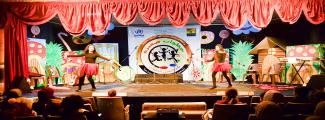Damascus
Tue, 01/21/2020 - 21:45
"Neither I nor You are Like That” Event- Dar Al Salam, Damascus
Mon, 12/23/2019 - 10:17
Event: I am Loved - Damascus
Thu, 12/19/2019 - 10:17
International Rural Women’s Day – Dar al-Karama for Older Persons, Damascus
Thu, 10/31/2019 - 09:25
Initiative: Knitting Winter Clothes – Al-Saydeh Zaynab, Rural Damascus
Sat, 10/19/2019 - 07:17
Rehabilitation of a Park in Dar al-Karama for Older Persons - Damascus
Thu, 10/17/2019 - 12:28
Training: Launching and Leading Youth Initiatives (GCLIs)— Damascus
Sat, 10/05/2019 - 11:43
The Community Center - lamaat dahab - Al Zahera
Wed, 05/22/2019 - 11:46


